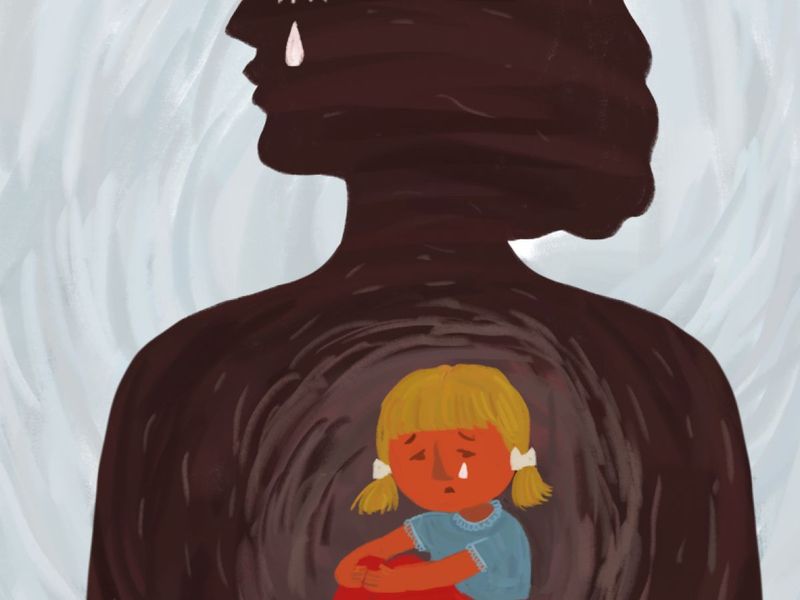16 Signs You Were Unfairly Criticized as a Child, and It’s Still Affecting You
You were told it was “tough love.” That they were just “trying to help.” That it was meant to “make you better.” But the truth is, constant criticism in childhood doesn’t toughen you up—it teaches you to doubt yourself.
And even as an adult, that inner voice—sharp, critical, never satisfied—might still sound suspiciously like someone from your past. Here are 16 subtle (and not-so-subtle) signs you were unfairly criticized as a child—and how it may still be affecting you today.
1. You constantly second-guess yourself.

Have you ever stood in front of your closet, trying on outfit after outfit, only to end up in the same old jeans because they feel safe? That’s second-guessing in action. It’s not just about clothes—it’s about every little choice we make. The fear of “getting it wrong” looms over us like a dark cloud.
This manifests in small ways, like overanalyzing a text message before hitting send, or wondering if your laughter was too loud at a dinner party. It’s exhausting!
The root of this constant doubt often ties back to childhood criticism. When you’re used to being told you’re wrong, you start to believe it. It’s a silent voice that questions every move, making even the simplest decisions feel like monumental tasks. Breaking free from this pattern starts with trusting your instincts and knowing it’s okay to make mistakes.
2. You replay conversations long after they’re over.

There’s this moment, after the party is over and the excitement fades, when you find yourself replaying every word you said, like a movie on repeat. Did I sound smart enough? Was I too quiet?
These questions haunt you, turning a pleasant memory into an anxiety-filled analysis. This habit isn’t just about attention to detail—it’s about fear. Fear that you might not have measured up.
Such relentless replays can trace back to a childhood where conversations were a minefield of possible criticism. You learned to scrutinize every word, trying to anticipate judgment. It’s a cycle that chips away at your confidence. The key to breaking free? Remind yourself that people rarely remember the details you obsess over. Offer yourself the grace of imperfection and let the moments just be.
3. You apologize… a lot.

“I’m sorry” has become your go-to phrase, hasn’t it? Even when you bump into a chair or when someone else makes a mistake, those words spill out almost reflexively. It’s like your default setting is set to ‘apologize’.
This constant need to say sorry often stems from a deep-seated belief that you’re always in the wrong, or that your existence is somehow an inconvenience. Childhood criticism ingrained this idea that anything less than perfection warrants an apology.
But here’s the thing—apologizing when it’s unwarranted can diminish your worth and make you seem less confident. Start by recognizing moments when an apology isn’t necessary, and instead, replace it with a simple acknowledgment or a smile. Slowly, you’ll rewire that reflex to one of self-assurance.
4. You struggle to take compliments.

“You did a great job!” they say, and your first instinct might be to duck your head, deflect, or downplay it. Compliments feel like a foreign language you’re not fluent in.
This reaction is rooted in a childhood where praise was rare or came with strings attached. You learned to question its sincerity or brace for the criticism that often followed. It’s a defense mechanism that’s hard to shake off.
Yet, accepting compliments is an act of self-love and acknowledgment of your worth. Try this: next time someone compliments you, pause, take a breath, and simply say, “Thank you.” Let their words sink in. It’s a small step, but one that can gradually shift how you see yourself in the mirror of others’ eyes.
5. You freeze when someone gives you feedback.

Feedback, even the gentle kind, can feel like a tidal wave crashing over you. You brace yourself, eyes widening, heart racing, as if preparing for a storm. It’s a visceral reaction to something that’s meant to be constructive.
This fear stems from past experiences where feedback was less about growth and more about pointing out flaws. As a child, feedback might have felt more like a spotlight highlighting your inadequacies.
The key to easing this tension lies in reframing feedback as a tool for improvement, rather than a personal attack. Take a moment to breathe and remind yourself that feedback helps you grow. Approach it with curiosity, not dread. It’s a shift in mindset that can transform how you view both yourself and the world around you.
6. You have a harsh inner critic that sounds like someone you used to know.

Inside your mind lives a critic with a voice eerily familiar. It’s the voice of someone who never let you feel “good enough”—perhaps a parent, teacher, or caregiver. This critic knows every insecurity, every fear.
It whispers doubts and magnifies mistakes, turning small errors into mountains of self-reproach. The harshness isn’t yours—it’s an echo from the past. You carry it like a shadow, often unaware of its presence.
Recognizing this voice is the first step to silencing it. Try naming it, separating it from your true self. When it pipes up, challenge it with kindness. Counter its negativity with affirmations of your worth. Over time, you’ll learn to quiet the critic and amplify the voice that truly belongs to you.
7. You feel like you always have to prove yourself.

Rest? What’s that? For you, downtime feels like a guilty pleasure. There’s always something to prove, a new goal to chase. Accomplishment isn’t just satisfying—it’s survival.
This relentless drive is born from the feeling that you were never quite enough. Childhood criticism convinced you that your value lay in your achievements, not in who you are as a person.
But here’s a gentle reminder: you are enough, just as you are. Your worth isn’t contingent on your productivity. Allow yourself the grace to rest without guilt. Celebrate not just your achievements, but the moments in between. It’s in those quiet times that you can truly connect with your essence and find fulfillment beyond doing.
8. You attach your worth to your productivity.

Every tick on your to-do list is a small validation of your worth. You measure your value by what you accomplish in a day. Sound familiar? It’s a treadmill that never stops.
This need to equate productivity with self-worth often originates from early criticism that equated laziness with failure. Each task becomes a rung on the ladder to worthiness.
But life is more than a list of completed tasks. It’s about being present, savoring moments, and knowing that who you are is not defined by what you do. Start by celebrating small wins and recognizing that rest is a vital part of life’s cycle. You’re worthy, not because of what you achieve, but because of who you are.
9. You’re afraid to try new things unless you know you’ll be good at them.

New challenges should be exciting, but for you, they’re often daunting. You hesitate, weighing the risk of failure. It’s not about the challenge itself, but the fear of criticism that failure might invite.
This fear traces back to a time when mistakes were met with judgment instead of encouragement. The idea of trying and not succeeding feels synonymous with shame.
Yet, growth lies in embracing the unknown, in trying and learning. Give yourself permission to be a beginner. Celebrate the courage it takes to step out of your comfort zone. Remember, every expert was once a novice who dared to try.
10. You avoid expressing your real thoughts or feelings.

You’ve perfected the art of holding back, haven’t you? In conversations, you scan the room, gauging reactions before you speak. It’s safer to stay quiet than risk disapproval.
Childhood taught you that real feelings and thoughts could lead to ridicule or dismissal. So, you bottle them up, presenting a curated version of yourself to the world.
But vulnerability is not a weakness; it’s a profound strength. Allow yourself to open up, even if it’s just a little. Share your thoughts and feelings, knowing that your voice deserves to be heard. It’s in these moments of honesty that true connections are made.
11. You expect rejection, even from people who love you.

Even in the warm embrace of loved ones, there’s a part of you waiting for the other shoe to drop. You expect rejection as if it’s inevitable, even when surrounded by love.
This stems from a deep-seated belief that love is conditional, instilled by early criticism that made approval feel fleeting. It’s hard to let go of the anticipation of disappointment.
But love, true love, isn’t fickle. It’s steadfast and patient. Allow yourself to trust in the love you receive. Practice gratitude for the relationships that nurture you, and remind yourself that you are worthy of love without conditions.
12. You obsess over doing things “the right way.”

Perfectionism can be paralyzing, can’t it? The need to do things “the right way” can turn even the simplest tasks into daunting challenges. You strive for flawlessness, fearing the critique that might follow.
This obsession often stems from a childhood where mistakes weren’t learning opportunities, but failures. You learned to equate perfection with acceptance.
Yet, life is beautifully messy, full of unexpected twists and turns. Embrace the imperfections as part of your journey. Allow yourself the freedom to make mistakes—they’re the stepping stones to growth. Remember, it’s okay to color outside the lines.
13. You read between the lines of every interaction.

Interpreting every word, gesture, and pause—it’s like being a detective of social cues. You read between the lines, searching for hidden meanings or potential criticisms.
This hyper-vigilance is a relic from a time when approval felt precarious. You learned to be on guard, anticipating the rug being pulled from under you.
But not every interaction hides a deeper meaning. Sometimes, things are just as they appear. Practice taking words and actions at face value. It’s a liberating shift that allows you to engage more authentically and less anxiously with those around you.
14. You crave praise—but don’t believe it when it comes.

Praise is like a warm ray of sunshine you long for, but when it hits you, there’s a shadow of doubt. You crave it, yet question its sincerity, waiting for the inevitable critique.
This confusing dance with praise is rooted in past experiences where compliments were rare or came with caveats. As a result, you struggle to trust genuine appreciation.
Embrace praise as a gift. Let it illuminate your strengths without casting shadows of doubt. Remember, you are deserving of accolades, and they don’t come with hidden agendas. Start by accepting them with a simple “Thank you,” and let them nurture your self-esteem.
15. You talk to yourself the way they talked to you.

In those quiet moments of self-reflection, do you catch yourself echoing harsh words? Words like, “I’m so stupid” or “I’ll never get it right.” It’s as if the voices from your past have become your own.
This self-talk mirrors the criticism you received as a child, internalized and replayed in your mind. It’s a narrative that undermines your confidence and self-worth.
To change this dialogue, bring awareness to your self-talk. When you catch yourself being unkind, pause and reframe with compassion. Replace harshness with understanding and affirmation. Over time, this practice can transform your inner narrative and empower you to speak to yourself with kindness.
16. You’re healing—but it still hurts.

Healing is a journey, not a destination. Even as you mend the wounds of the past, there are days where the scars still whisper, reminding you of where you’ve been.
Some days, the echoes of criticism feel louder than the progress you’ve made. It’s a delicate dance between growth and the occasional sting of old hurts.
But remember, healing isn’t about erasing the past—it’s about moving forward despite it. Celebrate how far you’ve come and acknowledge that it’s okay to still feel the hurt sometimes. With each step you take, you’re rewriting your story, one where criticism doesn’t define you.







